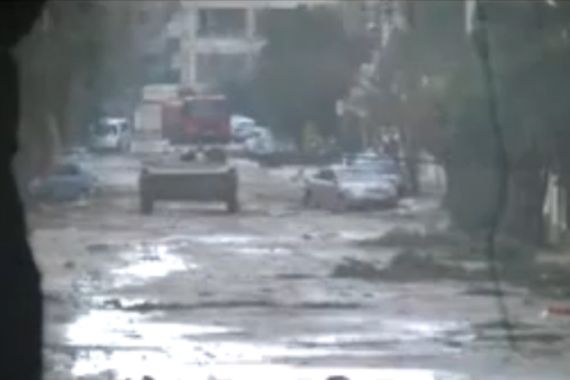Deadly assault continues on Syria’s Homs
Activists say scores more killed as government forces shell neighbourhoods in central city for a sixth day.

Scores of people have reportedly been killed in the Syrian city of Homs, as government forces continued a relentless assault on the central city for a sixth day.
Activists said on Thursday that the bombardments centred on the neighbourhoods of Bab Amr, Khaldiyeh and al-Bayada.
Speaking to Al Jazeera from the city, activist Hadi al-Abdallah said 12 homes were targeted in Bab Amr, including three inhabited buildings.
“Three families were killed when buildings were shelled. The martyrs are women, men and children. The bodies are badly mutilated,” he said.
In Khaldiyeh, Abdallah said one person was killed after government forces shelled the neighbourhood.
Activists say that hundreds of people have been killed and at least 570 injured since the army started its assault on the city last week.
“They targeted my neighbour’s house with rockets. I saw it with my own eyes,” Omar Shakir, a resident in Bab Amr, told Al Jazeera.
“This is the sixth day in a row we are being shelled by rockets, by mortars, by every weapon,” he said.
“[Syrian President] Bashar al-Assad is not a human…We are begging the world, please do something.”
Shakir said residents of the neighbourhood were seeking safety on the ground floor of buildings as there were no underground shelters.
Reviving observer mission
Homs, Syria’s third-largest city, has become the focus of both resistance and reprisal in the 11-month uprising as many areas have fallen under the control of increasingly bold opposition fighters who want to bring down the government.
In other parts of the country, activists reported clashes between Syrian troops and army defectors in Idlib, near the border with Turkey.
In eastern Deir al-Zor province, machinegun fire wounded dozens of people including women and children in Koriyeh, the UK-based Syrian Observatory for Human Rights said, adding that army reinforcements were being sent into the town.
|
|
As the violence grinds on, the international community is searching for new diplomatic approaches to stop the bloodshed.
Ban Ki-moon, the UN secretary-general, said on Wednesday that the head of the Arab League plans to send observers back into Syria and has raised the possibility of a joint mission with the UN.
Ban provided no specifics, but the idea appeared aimed at giving the regional group a boost after the league’s earlier mission was pulled out of the country because of security concerns.
“In the coming days we will further consult with the council before fleshing out details,” he said.
Ban also reiterated his “deep regret” over the council’s inability to speak with one voice on the crisis in Syria.
Russia and China used their veto powers on Saturday to block a Security Council resolution backing an Arab League peace plan that called for Assad to step aside.
‘Cold blood’
Ban said the lack of council unity had encouraged the Syrian government to step up its attacks on civilians.
“Thousands have been killed in cold blood, shredding President Assad’s claims to speak for the Syrian people,” Ban said.
|
|
“I fear that the appalling brutality we are witnessing in Homs, with heavy weapons firing into civilian neighbourhoods, is a grim harbinger of worse to come.”
Earlier on Wednesday, Navi Pillay, the UN rights chief, issued an appeal for urgent international action to protect civilians.
“I am appalled by the Syrian government’s wilful assault on Homs, and its use of artillery and other heavy weaponry in what appear to be indiscriminate attacks on civilian areas in the city,” a statement from the Office of the UN High Commissioner for Human Rights said.
In another diplomatic development, Ahmet Davutoglu, the Turkish foreign minister, announced plans for an international meeting.
“We are determined to establish a broad-based forum to promote international understanding with all countries concerned” with developments in Syria, Davutoglu said in a televised interview on Wednesday.
A senior EU official in Brussels said the 27-nation bloc could soon impose harsher sanctions against Syria.
The official said new measures could include bans on the import of Syrian phosphates, on commercial flights between Syria and Europe, and on financial transactions with the country’s central bank. The European Union imports 40 per cent of Syria’s phosphate exports.